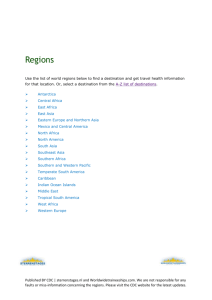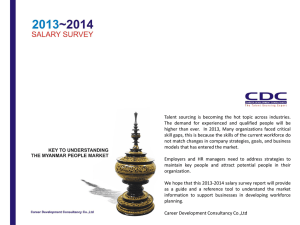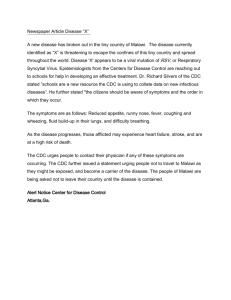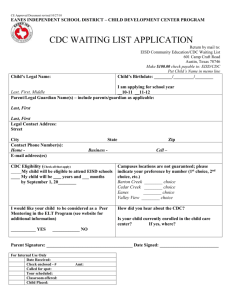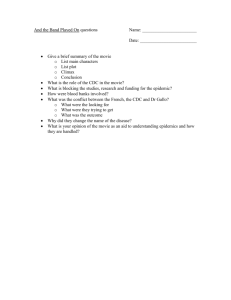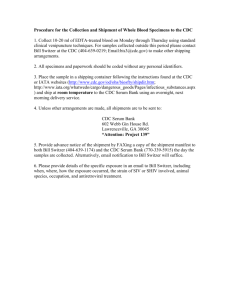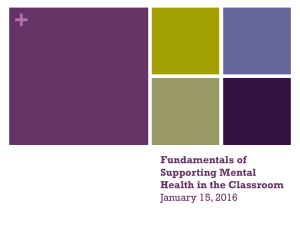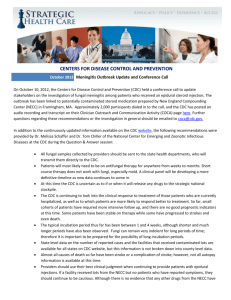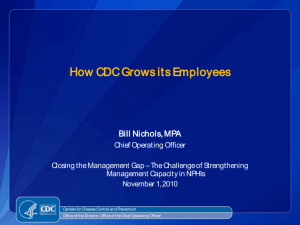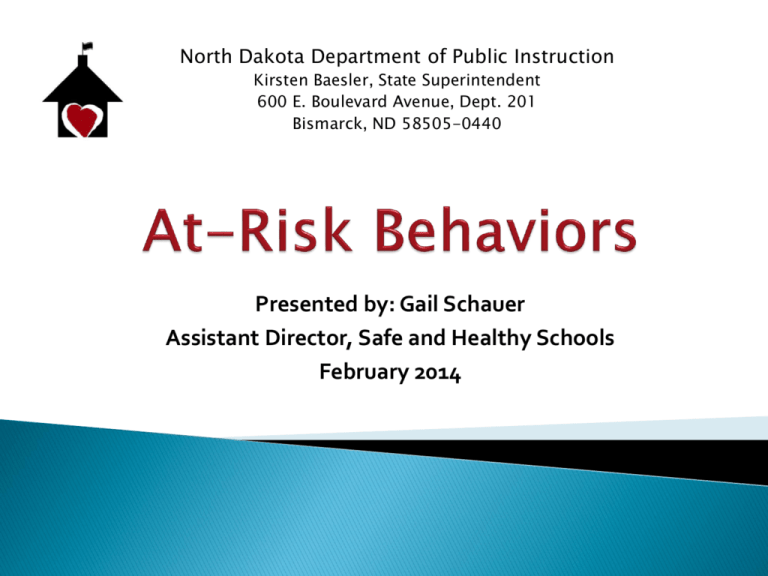
North Dakota Department of Public Instruction
Kirsten Baesler, State Superintendent
600 E. Boulevard Avenue, Dept. 201
Bismarck, ND 58505-0440
Presented by: Gail Schauer
Assistant Director, Safe and Healthy Schools
February 2014
All students achieve their
maximum education and social
potential
in a healthy and safe
school and community
environment.
Youth Risk Behavior Survey
(YRBS)
Designed to:
Monitor trends
Compare state and national
health risk behaviors
Plan, evaluate and improve
schools and communities
Developed in 1990
North Dakota participation began in 1995
Includes grades 7-12
Conducted in odd years
Voluntary and anonymous
No cost or fee for district, regional, state, or
national reports
Six priority health risk behavior categories
1.
2.
3.
4.
5.
6.
Alcohol and Other Drug Use
Dietary Behaviors
Injury & Violence
Physical Activity
Sexual Behaviors
Tobacco
Random participation identification
◦ Gender
◦ Age
◦ Urban/rural – typical student
Weighted data results
◦ All years but 1997
◦ Results represent all student populations
2013 Survey Results
◦ MS – 2135 students from 74 schools (84%)
◦ HS – 1,981 students from 62 schools (83%)
2011 National YRBS
◦ Overall response rate = 71%
Student honesty?
Remember, when…Did you or someone you
know…
◦
◦
◦
◦
◦
◦
◦
Drink before age 21?
Have sex in high school?
Engage in unprotected sex?
Smoke cigarettes?
Try drugs?
Call someone names or make fun of them?
Go to the local soda shop or burger restaurant?
CDC has a list of reliability checks
www.cdc.gov/yrbs
◦ 2013 questionnaire and item rationale
◦ Youth Online
National Data and states’ data
◦ Data and codebooks for the national surveys
◦ Publications, journal articles, and fact sheets
Morbidity and Mortality Weekly Report: Youth Risk
Behavior Surveillance – United States 2011
Other
Unintentional
Injuries
19%
Motor Vehicle
Crashes
28%
Other Causes
17%
Homicide
18%
Suicide
18%
CDC, 2010.
Unintentional injuries and violence
Tobacco use
Alcohol and other drug use
Sexual behaviors
Unhealthy dietary behaviors
Inadequate physical activity
CDC, 2013
5 smoke
7 are overweight
5 binge drink
12 lack physical activity
21 don’t eat enough fruits and vegetables
5 smoked cigarettes
4 smoked marijuana
4 were offered, sold, or given illegal drug - osp
5 binge drink
10 believe in their community teenage drinking is ok
18
do not get enough sleep
4
seriously considered attempting suicide
4
do not have adult to talk to @ problems
Areas of decrease between 2001 and 2013
Rode in car w/ someone who drank
43.5% in 2001 to 21.9% in 2013
Drove a car after drinking
26.8% in 2001 to 10.7% in 2013
Binge drank
41.5% in 2001 to 21.9% in 2013
Areas of decrease between 2001 and 2013
Had first drink of alcohol other than a few
sips before age 13
39.8% in 2001 to 15.2% in 2013
Had at least one drink of alcohol in last 30
days
59.2% in 2001 to 35.3% in 2013
Areas of decrease between 2001 and 2013
Tried cigarette smoking
67.9% in 2001 to 41.4% in 2013
Smoked a whole cigarette before age 13
25.4% in 2001 to 7.9% in 2013
Smoked in last 30 days
35.3% in 2001 to 19.0% in 2013
Areas of decrease between 2001 and 2013
Offered , sold, or given illegal drug
27.3% in 2001 to 14.1% in 2013
Grades 9-12
Levels of
Suicide
2001
2003
2005
2007
2009
2011
2013
Considering
19.0
13.6
15.4
10.4
12.4
14.7
16.1
Planned
13.9
11.3
12.2
8.1
10.5
12.1
13.5
7.5
7.2
6.4
8.8
5.7
10.7
11.5
Attempted
Chewed tobacco, snuff, or dip
10.3% in 2003 to 13.8% in 2013
Had sexual intercourse
42.0% in 2001 to 44.9% in 2013
Played video/computer games 3 or more
hours per day
18.6% in 2007 to 34.4% in 2013
Students who were obese
12.3% in 2001 to 13.5% in 2013
Students who were overweight
9.1% in 2001 to 15.1% in 2013
Obese or overweight
21.4% in 2001 to 28.6% in 2013
www.cdc.gov/obesity/data/adult.html
Coordinated School Health
School Health Advisory Council
School Connectedness
Comprehensive Physical Activity Plan
Social – Emotional Skills Training
Plus more …
Coordinated School Health
Health Education
Physical Education
Health Services
Nutrition Services
Counseling and
Psychological Services
Healthy School
Environment
Health Promotion for
Staff
Family/Community
Involvement
School Health Advisory Council (SHAC)
(school health team)
Review all school data
Use the School Health Index
Get involved in the school’s health plan
o Goals
o Activities
o Who’s responsible
Making the health
and academic
connection!
Letting students
know they are
important and
they are cared
about!
www.cdc.gov/HealthyYouth/AdolescentHealth/pdf/connectedness.pdf
↓ Knee arthritis pain & disability by 47%
↓ Dementia and Alzheimer’s by 50%
↓ Diabetes by 58%
↓ Risk of hip fractures in women by 41%
↓ Anxiety by 48%
↓ Depression by 30% - 47%
↓ Risk of death by 32%
The # 1 treatment for fatigue
This treatment has been shown
over and over again
to improve the quality of life!!!
23 ½ hours: www.youtube.com/watch?v=aUaInS6HIGo
Physical Education
Physical Activity During School
Physical Activity Before/After School
Staff Involvement
Family and Community Engagement
www.casel.org
Family Connectedness
Promote Parent Engagement
Mentoring Effects
Building Reliance
Plus more….
DPI Youth Risk Behavior Survey
www.dpi.state.nd.us/health/YRBS/index.shtm
CDC Youth Risk Behavior Survey
www.cdc.gov/HealthyYouth/yrbs/index.htm
CDC Health & Academics Data & Statistics
www.cdc.gov/healthyyouth/health_and_acade
mics/data.htm
CDC Adult Obesity Facts
www.cdc.gov/obesity/data/adult.html
Coordinated School Health
www.cdc.gov/HealthyYouth/cshp/
School Health Advisory Council (SHAC)
www.dpi.state.nd.us/health/resource/index.sht
m#s
School Connectedness
www.cdc.gov/healthyyouth/adolescenthealth/c
onnectedness.htm
Comprehensive Physical Activity Plan
www.cdc.gov/healthyyouth/physicalactivity/cs
pap.htm
Social – Emotional Skills Training
www.casel.org
Mentoring
www.mentoring.org/mentoringeffect
If you have any question, feel free to
contact me at:
Gail Schauer, Assistant Director
Dept of Public Instruction
Safe and Healthy Schools Unit
(701) 328-2265
gschauer@nd.gov
www.dpi.state.nd.us

